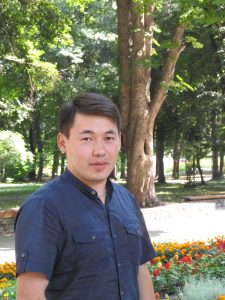
Assistant Professor
Research Interest
domain decomposition, discretization schemes, multiscale methods, a posteriori and a priorri error analysis, robust and efficient solution algorithms
Dr. Yerlan Amanbek is currently an Assistant Professor at the Department of Mathematics, SST, NU. He received a PhD in Computational Science, Engineering and Mathematics (CSEM) at the Oden Institute for Computational Engineering and Sciences (OICES) in the University of Texas at Austin, USA in 2018. He was at the Center for Subsurface Modeling and was supervised by Professor Mary Wheeler. In fact, the ICES (Oden institute) ranked No.1 for Interdisciplinary Applications of Mathematics. His research focuses on the numerical analysis of partial differential systems that arise in subsurface phenomena using mathematical modeling and scientific computation. His main interests are finite element methods, numerical analysis including a priori and a posteriori error analysis, scientific computing, computational transport phenomena, and numerical reservoir simulations.
He received the Best Poster Award at the 2017 Texas Applied Mathematics and Engineering Symposium, USA. He also received SIAM Travel Award and RECS Program Award, USA. In 2018, he had an externship at Schlumberger Sugar Land, Houston, Texas, USA.
As NU Team Leader, he introduced the Nazarbayev University Team at the International Mathematical Competition in 2012 (for the first time) and in 2013. The best achievement was in 2013 when the NU team result ranked in the top 30 universities. He went to Al-Khorezmi International Mathematical Olympiad 2018 as Team Leader and the NU team came back with medals.
Full list of publications can be found on google scholar page. Selected publications:
- Kurmanbek, B., Amanbek, Y., & Erlangga, Y. (2022). A proof of Anđelić-Fonseca conjectures on the determinant of some Toeplitz matrices and their generalization. Linear and Multilinear Algebra, 70(8), 1563-1570.
- Rakhimzhanova, A., Thornton, C., Amanbek, Y., & Zhao, Y. (2022). Numerical simulations of sand production in oil wells using the CFD-DEM-IBM approach. Journal of Petroleum Science and Engineering, 208, 109529.
- Kurmanbek, B., Erlangga, Y., & Amanbek, Y. (2022). Inverse properties of a class of seven-diagonal (near) Toeplitz matrices. Special Matrices, 10(1), 67-86.
- Kamashev, A., & Amanbek, Y. (2021). Reservoir Simulation of CO2 Storage Using Compositional Flow Model for Geological Formations in Frio Field and Precaspian Basin. Energies, 14(23), 8023.
- Kurmanbek, B., Erlangga, Y., & Amanbek, Y. (2021). “Explicit inverse of near Toeplitz pentadiagonal matrices related to higher order difference operators”. Results in Applied Mathematics, 11, 100164.
- Merembayev, T., Kurmangaliyev, D., Bekbauov, B., & Amanbek, Y. (2021). “A Comparison of Machine Learning Algorithms in Predicting Lithofacies: Case Studies from Norway and Kazakhstan”. Energies, 14(7), 1896.
- Amanbek, Y., Du, Z., Erlangga, Y., da Fonseca, C. M., Kurmanbek, B., & Pereira,
A. (2020). “Explicit determinantal formula for a class of banded matrices”. Open Mathematics, 18(1), 1227–1229. - Kashkynbayev, A., Amanbek, Y., Shupeyeva, B., & Kuang, Y. (2020). Existence of traveling wave solutions to data-driven glioblastoma multiforme growth models with density-dependent diffusion. Mathematical Biosciences and Engineering, 17(6), 7234–7247.
- Amanbek, Y., Singh, G., Pencheva, G. and Wheeler, M.F. (2020). “Error indicators for the incompressible Darcy flow problems using Enhanced Velocity Mixed Finite Element Method”. Computer Methods in Applied Mechanics and Engineering, 363, 112884.
- Issanov, A., Amanbek, Y., Abbay, A., Adambekov, S., Aljofan, M., Kashkynbayev, A., & Gaipov, A. (2020). “COVID-19 Outbreak in Post-Soviet States: Modeling the best and worst possible scenarios”. Electronic Journal of General Medicine, 17(6), em256.
- Amanbek, Y., Balgayev, I., Batyrkhanov, K., & Tan, M. (2020). Adoption of e-Government in the Republic of Kazakhstan. Journal of Open Innovation: Technology, Market, and Complexity, 6(3), 46.
- Amanbek, Y., Singh, G., Wheeler, M.F. and van Duijn, H., 2019. Adaptive numerical homogenization for upscaling single phase flow and transport. Journal of Computational Physics, 387, pp.117-133.
- Amanbek, Y. and Wheeler, M.F., 2019. A priori error analysis for transient problems using Enhanced Velocity approach in the discrete-time setting. Journal of Computational and Applied Mathematics, 361, pp.459-471.
- Amanbek, Y., Singh, G. and Wheeler, M.F., 2019, June. Recovery of the Interface Velocity for the Incompressible Flow in Enhanced Velocity Mixed Finite Element Method. In International Conference on Computational Science (pp. 510-523). Springer, Cham. (A-rank conference)
- Singh, G., Amanbek, Y. and Wheeler, M.F., 2017, October. Adaptive homogenization for upscaling heterogeneous porous medium. In SPE Annual Technical Conference and Exhibition. Society of Petroleum Engineers.
- Narbayev, B., & Amanbek, Y. (2022). Finite Element Model for Wind Comfort Around a Tall Building: A Case Study of Tower of Qazaqstan. In International Conference on Computational Science and Its Applications (pp. 540-553). Springer, Cham.
- Rakhimzhanova, A., Thornton, C., Amanbek, Y., & Zhao, Y. (2021). “Numerical simulations of cone penetration in cemented sandstone”. EPJ Web of Conferences, 249, 14010.
- Kazidenov, D., Khamitov, F., & Amanbek, Y. (2022, June). “Coarse-graining methods for modified JKR contact model on triaxial compression test”. In the 56th U.S. Rock Mechanics/Geomechanics Symposium.
- Merembayev, T., & Amanbek, Y. (2022, June). “Time-series event prediction for the uranium production wells using machine learning algorithms”. In the 56th U.S. Rock Mechanics/Geomechanics Symposium.
- Merembayev, T., Bekkarnayev K., & Amanbek, Y. (2021, June). “The identification models of the copper recovery using supervised machine learning algorithms for the geochemical data”. In the 55th U.S. Rock Mechanics/Geomechanics Symposium.
- MATH 161 – Calculus I
- Math 162-Calculus II
- Math 351 Numerical Methods with Applications
- Math 551 Advanced Numerical Methods
- Math 519 Scientific Computing
- Math 477 Applied Finite Element Methods
- Math 518 Applied Finite Analysis



